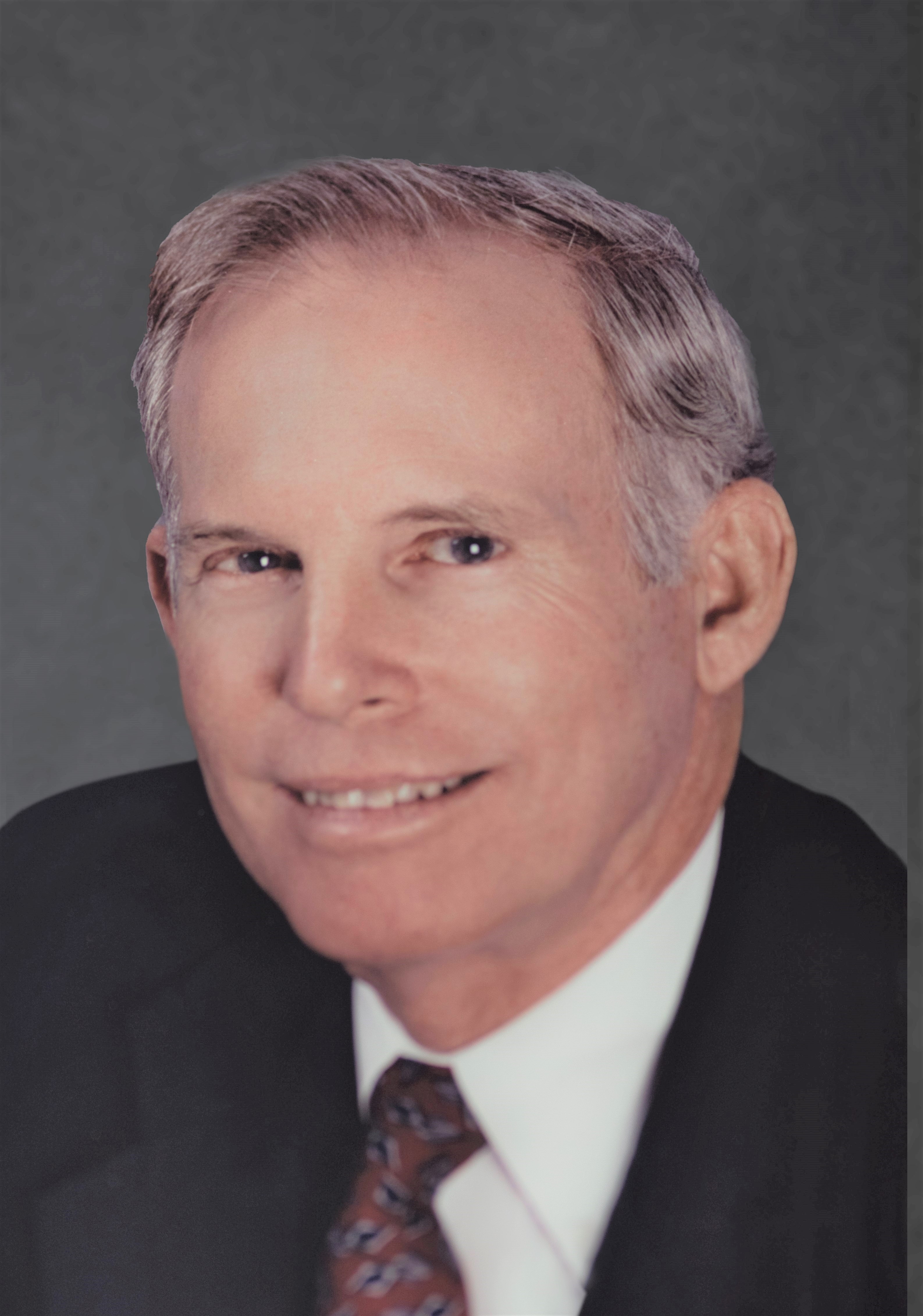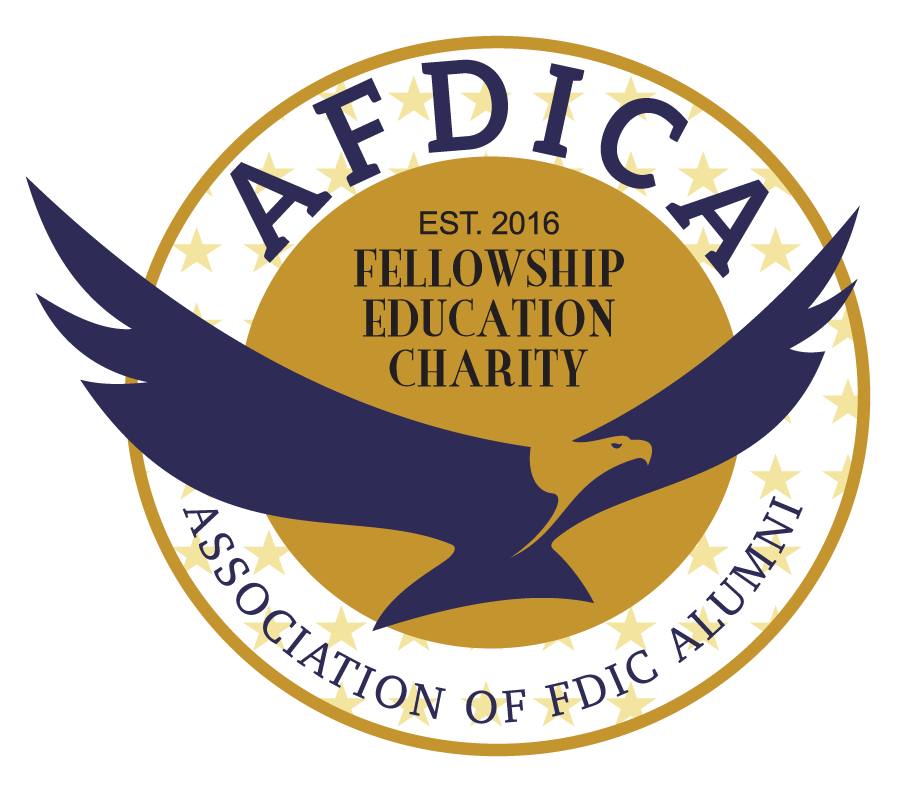John F. Bovenzi, Bill Dudley, Martha Duncan, Maggie Thompson, and William R. WatsonAFDICA's 2023 Life Long Career Achievement Awardees
Association of Federal Deposit Insurance Corporation Alumni, Inc. The By-Laws of the Association of Federal Deposit Insurance Corporation Alumni, Inc. (AFDICA) allow the recognition of life-long or career achievements of outstanding current or former FDIC employees and their commitment to service to their country. There are separate award categories for living and posthumous awardees. The criteria for the award should weigh heavily on the significance and long lasting impact of a nominee's accomplishments. Criteria may include, but may not be limited to achievements in the following areas: (1) fellowship, (2) education, (3) charity or (4) support of the mission of AFDICA or the FDIC. On October 13, 2023, during AFDICA's annual meeting, AFDICA President Gail Verley presented the Association's 2023 Life Long Achievement awards to five worthy recipients: Jon Bovenzi, Bill Dudley, Martha Duncan, Maggie Thompson, and posthumously to William R. Watson . Attributes and Achievements of the Awardees: This year we have five worthy recipients (in alphabetical order):
During John’s almost three decades with the FDIC, he established himself as one of the most outstanding and consequential career employees in the agency’s history. Beginning as a financial economist in 1981 in the Corporation’s research and strategic planning arm, John quickly established himself as an extremely intelligent, creative, and collaborative researcher and policy developer. He showed innate interpersonal and collaborative skills that he used along with his growing body of knowledge of the banking industry and its evolving challenges in the early 80s, to contribute to several important research and policy documents to deal with the savings and loan and banking crises. Assignments with Board Member C.C. Hope, Jr., in 1986 and as Deputy to Chairman Bill Seidman from 1989 through 1992, provided John with an industry-wide perspective of the state and federal financial regulatory challenges and executive level experience in managing the growing organization as it resolved over 650 bank failures. During this time, John developed crisis management and organizational skills that would redound to the Corporation’s benefit during the next two decades, again and again through the financial crises to come. In an agency full of experienced and talented professionals and leaders, he often was the critical piece to solving the puzzle. Whether he was leading the resolutions and receivership function or working to restructure FDIC’s approach to new threats, John was the right person at the right time and place to make the decisions necessary to solve the present organizational and policy problems. These problems were daunting and often presented matters of first impression to the FDIC, its regulatory partners, Congress, and the government writ large. Very painful organizational and personnel decisions had to be made to address the ever-changing threats to the financial markets and the banking industry. John persevered through successive financial crises, massive organizational growth, and painful downsizing, by exhibiting his calm, measured and decisive brand of leadership. In late 1999, having already accomplished a great deal in his career that had benefited the Corporation and country, John took on his last and most significant role as Deputy to the Chairman and Chief Operating Officer. In this role, he cemented his legacy by organizing the agency to tackle future crises and mentoring dozens of senior and middle managers to take on increased responsibilities in the years ahead. Just as he had received high level assignments early in his career, John identified rising or hidden talent across the Corporation to serve as his senior staff assistants or members of important project groups or committees, thereby creating bench strength for years to come. He continued to serve as a role model to his subordinate executives on how to lead with quiet confidence and to collaborate within their functions and across the organization. These formal and informal mentoring efforts by John had a ripple effect across the units under his purview – the right tone was set at the top and was emulated through the ranks. He communicated the vision and supported his team while they achieved results. The FDIC remains an effective, highly professional organization with many of its current leaders having been developed by John or by executives who worked closely under his leadership. After leaving the FDIC, John joined the Oliver Wyman company and continued to make contributions to a sound financial system, all the while continuing to give back by serving as an active mentor and sounding board to many former colleagues who moved into different positions where they were still able to make a difference, after leaving the FDIC.
William Dudley (Bill) had a long and successful career beginning in 1971 as a field liquidator with the FDIC. As a field liquidator he was assigned tasks of increasing responsibility, including being designated in charge of the failure of the 20th largest bank in the US, Franklin National Bank in New York City in 1974, a $3 billion bank. Such important assignments continued with: Continental Illinois National Bank, Chicago, IL a $30 billion bank, at the time the largest to ever fail, The Federal Land Bank of Jackson, MS with $2.4 billion in assets and in 1988 Republic National Bank, Dallas, TX, a $20 billion bank. He began his administrative career in 1980 where he rose to Associate Director in a triumvirate relationship with two colleagues reporting to the Division Director. As Associate Director (Credit), Bill was responsible for all credit policy nationwide and developed the Division’s first Credit Manual, later known as the Asset Disposition Manual. While still at headquarters in Washington, Bill was responsible for presenting case memoranda to the Committee on Liquidations, Loans and Purchases of Assets and the Board of Directors. When four regional offices were established to manage the forthcoming flood of bank and savings and loan failures, Bill was appointed Regional Director of the Atlanta Region. After retiring from the FDIC in 1995, Bill spent ten years doing international financial consulting work focusing on improving developing countries deposit insurance systems and advising on better methods for bank resolution activities. He did this work for The World Bank, The International Monetary Fund (IMF), KPMG Consulting and his firm, WMD Consulting Services. Bill worked in thirteen countries including: Armenia, Bosnia, (seven assignments), Bulgaria, China, Indonesia, Korea, Kenya, Mongolia, Montenegro, Pakistan, the Philippines, Serbia and Slovakia. As Liquidator of the failed National Bank of Bosnia and Herzegovina, the IMF informed him he was the only person ever to have liquidated a country’s Central Bank. His first task was to place a freeze on all bank deposits as 98% of deposits and loans were to government departments and agencies. When the Central Banker refused to freeze, the President of Bosnia became involved. Bill negotiated an agreement with the President that all loans would be repaid within one year. They complied with the agreement and the Receivership was consummated within 18 months.
Maggie Thompson and Martha Duncan, who retired from the FDIC’s Division of Resolutions and Receiverships in February 2021 and November 2018 respectively. Their combined years of service to FDIC total nearly 70 years. Both Maggie and Martha are members of the Association of FDIC Alumni, Inc. (AFDICA) in good standing. Throughout their adult lives, both Maggie and Martha were known by their FDIC colleagues as smart, caring, hardworking people who enjoyed their jobs and those with whom they worked. When Maggie retired in February 2021, her position title was Assistant Director of Monitoring/Risk Analysis. Upon Martha’s retirement in November 2018, her title was CM-Asset Management. Both worked at the Dallas Regional Office in Dallas, Texas. In 2014, Maggie and Martha began talking about organizing an annual Golf Tournament, primarily consisting of FDIC colleagues. As avid golfers, they understood that finding other like-minded, competitive colleagues at FDIC would be fun. On September 19, 2014, MTI (Maggie Thompson Invitational) was born and attended by approximately 50 people, most of whom were FDIC colleagues from the Dallas Regional Office. An entry fee was paid by each golfer and the money pooled was used to reward golfers for shots like Closest to the Pin, Longest drive and a Hole in One. The first MTI was a wonderful success story and word spread quickly about the wonderful golf tournament that Maggie and Martha have created. It soon became apparent with the success of the golf tournament that the ability to not only have fun but also to help less fortunate people was not only feasible but something they felt compelled to do. Both Maggie and Martha have always felt a need in their hearts to help families with food insecurity issues, one of the more pressing needs in our nation today. The CDC estimates that in 2022, over 42 million Americans were Food Insecure out of the nation’s population of 340 million. Further, despite enormous efforts being made across the country, food insecurity is growing, not shrinking. Over the course of the last 10 years, the primary focus of the Maggie Thompson Invitational has shifted from a competitive golf outing consisting of primarily Dallas FDIC employees, to an annual Golf Tournament that is open to everyone and is designed to raise money for three charitable causes. In recognition of the growing charitable effort, Maggie and Martha created an IRS 501 C (3) charitable organization in September 2022 (MTI) in order to grow funding for their charitable causes: 1) The Amity Hospice Thanksgiving Dinner – https://amityhospice.com AMITY HOSPICE THANKSGIVING DINNER: Several years ago, Maggie and Martha teamed up with friends Gregory and Joni Smith to make Thanksgiving dinners for north Dallas families that have a family member who is dying and in hospice care. Using money donated to MTI, Maggie and Martha will purchase over 30 turkeys, several pounds of potatoes, green beans, corn and other food items. They understand that if they cook the turkeys and make the food themselves, the amount of money dedicated to this effort goes much further than if pre-made items are purchased at the store. Accordingly, Maggie and Martha begin to set up tents, assemble a half dozen fryers on Thanksgiving Eve then at 4:30am on Thanksgiving Day, they drop the first of over 30 Turkeys into the fryers. In an assembly line production, food is fried, cooked, stirred, baked, whipped and otherwise made into delicious meals that are carefully packed into transport containers and driven to the homes of selected families being supported by Amity Hospice. This large, well-orchestrated project is carried out by Maggie, Martha, 18 Drivers and 15 cooks. It concludes many hours later with delivery of hot Thanksgiving meals to families in the north Dallas area that are spending their last Thanksgiving dinner with their dying family members. In some instances, if the Amity Hospice patient has died but the family has been identified as a possible low income or food insecure family, they remain on the list to receive the Thanksgiving Day meal. COMMUNITY GARDEN KITCHEN: Community Garden Kitchen in McKinney, Texas began in 2014, blossoming from a discussion among friends seated at a kitchen table about food insecurity in the community. The group decided to build a 4,800 square foot multi-use facility to feed those in need. The concept is unique - those who are hungry can come into the restaurant and sit down at a table with their children or friends and order from a menu of entrees and desserts for the day. They are served by waiters and waitresses and hot meals are served with dignity and grace. Those being served are not asked to pay a cent for the meals prepared at the Community Garden Kitchen. Both Maggie and Martha have been long time supporters of this wonderful organization whose goal is to “end hunger in the community.” RANDOM ACTS OF KINDNESS: From donations made to MTI, an amount of $1,000 is held back from the charitable pool collected each year. As described by Martha, “What we do is to give 10 people a gift of $100 on the spot for something they want or need but are unable to buy for themselves. It gives us instant gratification to know and see how people respond to our donations. The Random Acts of Kindness are a means to provide small gifts to several entities. A few dollars can mean a world of difference to people less fortunate than us. The gifts truly are random: We have helped rebuild a cat shelter in Croatia, purchased toys for several organizations, sent our local high school cheerleaders to Nationals, funded disaster relief, supported LGBTQ causes, promoted reading, fed the homeless, encouraged healing through music, and sponsored spaying and neutering of dogs and cats. When we see someone in need, we use the tournament donations to step in to help.” Summary: The Maggie Thompson Invitational will host its 10th annual golf tournament on August 24, 2023, at The Courses at Watters Creek in Plano, Texas. In the preceding nine years, total donations to charitable causes are $26,222 and total prize money awarded to players to-date is $12,374. This year, 124 players will take to the course with the goal of raising $15,000, which if reached, will bring total charitable donations to over $40,000. Maggie and Martha realized last year that in order to raise more money in support of their charities, reaching out to local companies and gaining corporate sponsors is the only way to grow charitable funds in a significant way. Between a newly signed corporate sponsor, the 124 golfers who will play on August 24th and their many additional friends and family members, they are confident in their $15,000 fund raising goal.
William R. Watson (Roger) - posthumous award (Picture not available) Roger Watson, a DIR Economist, was a 30+ year FDIC employee who was a long time economic advisor to FDIC Board members over his many years. He was a key contributor to important Board decisions and had the confidence of members of the "Committee on Liquidations, Loans and Purchases of Assets" and the Board. Roger was also well liked and should be recognized for his career contribution. Roger Watson was the Director of the Division of Research & Statistics at the FDIC until its merger with the Division of Insurance in 2002. He oversaw many important financial and economic studies over his career that are too numerous to list here, but include studies such as “Merging the BIF and SAIF… .” One practical example led by Roger Watson was the creation of Risk-related Deposit Insurance Premium System that was mandated by FDICIA in 1991 and executed in 1993 under FDIC Chairman L. William Seidman. Roger was an insightful and quality administrator who inspired and guided his staff to produce high caliber work, similar to his own work at the FDIC.
Past Recipients: The 2018 recipient was Dwight Hills Wilson II, Chief of the Transportation Unit in DOA at headquarters - posthumous award. The 2019 recipient was Andrew C “Skip” Hove, Vice Chairman and Acting Chairman of the FDIC - posthumous award.. The 2020 recipients were Mitchell Glassman, Douglas H. Jones and Robert W. Mooney - posthumous award for Mr. Mooney. The 2021 recipient was Dr. Richard Brown, Chief Economist - posthumous award. The 2022 recipients were Lesylee Hodge and Norman Neece
updated 9/12/2023
|


 John F. Bovenzi
John F. Bovenzi William Dudley (Bill)
William Dudley (Bill) Martha Duncan and Maggie Thompson
Martha Duncan and Maggie Thompson